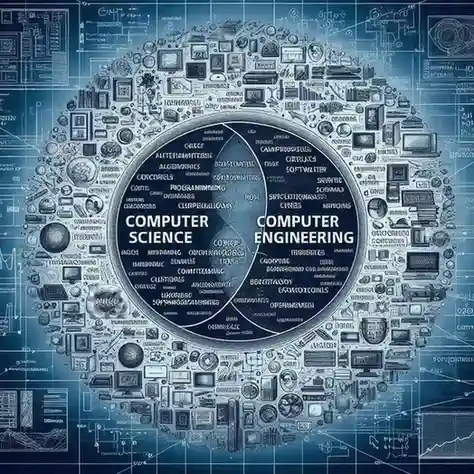Table of Contents
ToggleComputer Science vs. Computer Engineering
Need clarification on which discipline, the two disciplines that stand out as pillars in the evolving landscape of technology, Computer Science (CS) and Computer Engineering (CE), is designed for you…? Here is a small guide to make your dilemma accessible. The two fields have much in common regarding computing but differ significantly, offering unique perspectives and opportunities. Delving into each discipline’s insights, similarities, and dissimilarities can lead to exciting and growing prospects for tech enthusiasts.

“In any decision, the best thing you can do is the right thing. The worst thing you can do is nothing.” – Theodore Roosevelt
The Essence of Computer Science
Computer Science is about studying Algorithms, Data Structures, Software Systems, implementation, and underlying principles. The topics here range from computational theory to complexity analysis. It involves big names like software development, artificial intelligence, cybersecurity, and forensics.
Computer science focuses on the fundamental principles of computation and devising efficient and accurate solutions for problems. Computer science students delve into programming languages, database management systems, and computer architecture and excel in problem-solving and algorithm analysis. Here, the students learn to efficiently solve complex problems by dissecting them into simpler and smaller parts. These smaller parts are solved and coded into the digital world to help humans with their tasks. With this discipline, the students get versatile skills and many career options, such as software engineers, data science analysts, etc.
The Essence of Computer Engineering
On the other hand, computer engineering is a blend of computer science and electrical engineering concepts. It focuses on the hardware software interface and aims to design computing systems with a digital logical design, computer architecture, embedded systems, and hardware and software integration. Computer engineering students have a multidisciplinary landscape, which leads to insights into both hardware and software aspects of computing. The students here will learn how to design and optimize computer systems. It includes microprocessors, integrated software networking infrastructure, and embedded devices. It is a more hands-on discipline that involves expertise in abstract, computational concepts and tangible hardware implementations.
Due to its emphasis on hardware and system-level engineering, this discipline equips the students for a diversified range of roles. The students can work as hardware engineers, system architects, and embedded system developers and contribute to the development of cutting-edge technologies across the world.

Bridging the Gap: Overlapping Areas
Though there are distinctions between the two streams, they are interconnected with each other in some areas. To mention a few, both streams use computer architecture. However, with different perspectives- CS focuses on architectural principles to improve software performance, while CE focuses on designing and implementing hardware architectures for efficient computation.
There is a subsequent rise in interdisciplinary fields like the Internet of Things (IoT) and cybersecurity systems. Machine learning and artificial learning are The most significant blurring lines between CS and CE. Professionals seek expertise from both disciplines to confront challenges with complex hardware, software, and computational algorithms.
Choosing Your Path
It may become challenging for aspiring technologists to decide which discipline to choose. Depending upon problem-solving abilities and skill sets, one can easily decide. Those passionate about software development, algorithmic problem-solving, and exploring the frontiers of artificial intelligence may find their calling in Computer Science. On the other hand, individuals fascinated by hardware design, system architecture, and the intricacies of digital circuits may gravitate toward Computer Engineering.
Looking at job opportunities and salaries, computer network architects earn $120,520 on average, while system analysts earn $99,270 on average. Software developers with Bachelor’s degrees, on the other hand, earn up to $124,200, as per the reports of the Bureau of Labor Statistics.
Conclusion
These ever-evolving fields of technology serve as a testament to the breadth and depth of the computing landscape. Each discipline has unique perspectives and importance, but considering the advancing fortunes of human knowledge and innovation, their amalgamation has become the need of the hour. So, whether you excel in any discipline, the future will be rewarding and filled with endless possibilities.
